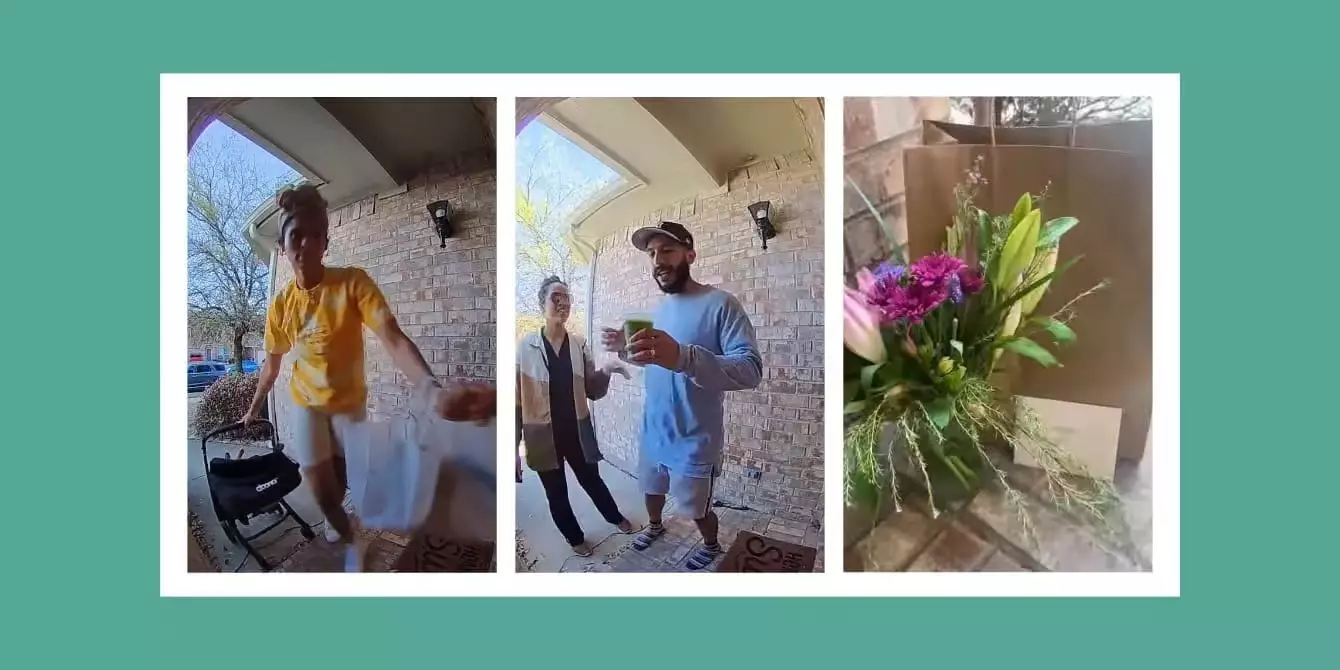When we think about grief, we often limit our understanding to the loss of loved ones or cherished relationships. However, the experience of miscarriage encapsulates a particular kind of sorrow that is both profound and isolating. This often-overlooked facet of grief, which affects around one in four pregnancies, can leave individuals feeling alone in their pain. The viral video posted by @curlswithapromise entitled “Views From My Front Door Camera After My Miscarriage,” shines a light on this silent suffering while also illustrating a potent truth: the importance of community in the healing process.
In the face of societal stigma surrounding miscarriage, many women suffer quietly, grappling with the emotional fallout of unfulfilled dreams and expectations. It’s a heart-wrenching paradox; despite the frequency of miscarriage, conversations about the topic remain shrouded in discomfort. The testimonials shared by @curlswithapromise reflect this double-edged experience of grief—one replete with personal loss and an unexpected surge of support from those around her.
The Profound Impact of Vulnerability
The raw honesty that @curlswithapromise exhibits resonates deeply with anyone who has endured similar hardships. In her poignant video, we witness more than just people delivering meals and flowers; we witness a community coalescing to help shoulder the burden of loss. Her willingness to share her story highlights the transformative power of vulnerability. By allowing others to step into her pain, she cultivated an environment of empathy and understanding—elements critical to navigating the often lonely path of grief.
Many individuals hide their sorrow out of fear of burdening loved ones or feeling misunderstood. Yet, as this narrative demonstrates, inviting others into our struggles can foster connections that heal. One comment from her viewers succinctly encapsulated this sentiment: “Your ability to let them [your community] in is the most beautiful piece of this.” That ability is not merely a gift to oneself; it is also an opportunity for others to express their love and compassion.
Community as a Catalyst for Healing
Support systems are crucial in managing the emotional turmoil that accompanies miscarriage. @curlswithapromise emphasizes a vital aspect: actively participating in the healing process, rather than merely offering platitudes. The outpouring of love she received exemplifies how important it is for those who know someone experiencing loss to take tangible action. Cooking a meal, providing a listening ear, or simply sitting in silence can often mean more than well-intentioned but hollow phrases.
This concept challenges all of us to reconsider how we respond to others’ grief. Often, we may shy away from engagement due to discomfort or uncertainty about what to say or do. However, witnessing the powerful impact of even the simplest acts of kindness—as evidenced in the viral video—reminds us that community care is fundamental in times of hardship.
Moreover, the comments from viewers reveal a shared understanding of grief that transcends personal experience. Many echoed their own stories of isolation, providing a rich tapestry of communal heartbreak and, ultimately, resilience. As one viewer noted, the solitary nature of grief can feel unbearable, but kindness from others has the potential to mend what seems broken.
Guiding Principles for Support
With this newfound understanding of the intricacies of grieving, the question becomes: how can we better support those who have experienced a miscarriage? Below are essential strategies that can offer effective support based on shared experiences and expert guidance:
1. Be Present: Actions often speak louder than words. Rather than rely solely on phrases of condolence, offer your presence. Whether it’s delivering meals or lending an ear, your physical presence can be incredibly comforting.
2. Listen Without Judgment: It is crucial to create a space where individuals feel safe to express their feelings without fear of judgment or unsolicited advice. Sometimes simply lending an ear can provide immense relief.
3. Respect Their Grieving Process: Every individual grieves differently. Some may want to talk openly about their feelings; others may need solitude. It’s key to follow their lead and be patient throughout their journey.
4. Sustain Your Support: The grieving process does not end after the initial shock. Continued outreach and support in days and weeks after the loss can reaffirm to individuals that they are not alone.
Through her narrative, @curlswithapromise encapsulates a profound truth: in the darkest moments, it is the love and support of our communities that can illuminate the path toward healing. This video serves as a powerful reminder that grief should not be faced alone; instead, it is a call-to-action for us to cultivate community, empathy, and unwavering support amid life’s challenges.

